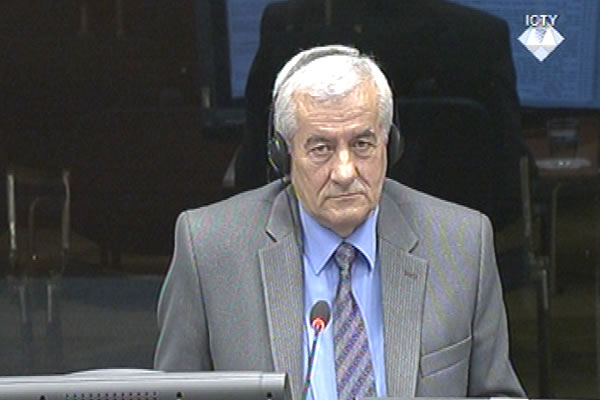Home
‘VOLUNTARY’ PRISONERS IN PRIJEDOR PRISON CAMPS
Rade Javoric, former commander of the Prijedor Territorial Defense, argues that Muslims and Croats went to the investigation and collection centers in Keraterm, Omarska and Trnopolje voluntarily. At the same time the witness admits that some prisoners were killed and raped there. This prompted the judges to ask him if they volunteered to go to places where they were victims of crimes
 Rade Javoric, defence witness at Rako Mladic trial
Rade Javoric, defence witness at Rako Mladic trial Rade Javoric, former commander of the Territorial Defense in Prijedor, gave evidence in Ratko Mladic’s defense. The witness stated that there were some Muslims and Croats who fought in the Bosnian Serb Army. During the war in Croatia, there was a call-up in the Prijedor area and many non-Serb conscripts responded. Some of them left the units when the JNA was transformed into the VRS, some reported to compulsory work service, while some remained in the Serb army until the end of the war.
In his statement to the defense, the witness blamed the Muslim paramilitary units for starting the conflict in Prijedor: they attacked the Serb army at the check points in the villages of Hambarine and Kozarac. These attacks led to actions against Muslim paramilitaries. The witness also mentioned in his statement that there were ‘investigation and collection centers’ in Prijedor and that the police – not the army – were in charge of them.
In the cross-examination, prosecutor Traldi put it to Javoric that Muslim and Croat prisoners were detained in Prijedor prison camps, Keraterm, Omarska and Trnopolje, in terrible conditions. The prisoners were killed and raped, the prosecutor noted. ‘I don’t know about it, but I have heard there were such incidents’, Javoric replied, stressing that he never visited any of the investigation centers. According to Javoric, he heard about those events from other people.
Javoric rejected the suggestion that in late May 1992, after the Bosnian Serb army and police attacked Hambarine, Kozarac and other villages near Prijedor, as many as 7,000 non-Serbs were arrested and transferred to the Prijedor prison camps. The witness claimed that the non-Serbs went there voluntarily because they didn’t feel safe outside any more. The army helped the non-Serbs by escorting them safely to Keraterm, Omarska and Trnopolje, Javoric explained.
‘You have just said’, Judge Orie remarked, ‘that you know people were killed and raped in those three centers. Should we then understand that they went voluntarily to places where they would be victims of crimes’? Javoric told him that those who went there voluntarily weren’t killed. Only those of the prisoners who had been arrested because they had refused to lay down their arms ended up being killed, Javoric explained. Asked if killing a prisoner was a crime, the witness confirmed it was.
The prosecutor put it to the witness that it was general knowledge in Prijedor that the prisoners were detained in the prison camps in terrible conditions. Javoric said that in 1992 when the prison camps were open, he spent most of his time in the battlefield. There probably were some individuals who entered the investigation centers and ‘committed inappropriate acts’. But, as the witness insisted, they will be punished for those deeds, ‘thank God’. Asked if anyone was punished during the war for the crimes in the Prijedor prison camps, Javoric said he didn’t know much about that.‘If they weren’t punished, it’s a pity’, the witness added.
In his statement Javoric noted that the ‘army didn’t provide security in the collection and investigation centers in Prijedor’. The prosecutor noted that at Mladic’s trial so far, the judges have heard evidence showing that the military units secured the prison camps. Also, some military officers took part in prisoner interrogations, the prosecutor said. Javoric agreed in part with the allegations.
Ratko Mladic’s trial continues tomorrow with the evidence of a new defense witness.
Linked Reports
- Case : Mladic
- 2015-02-09 CONTESTING SREBRENICA PENITENT’S ‘ABSOLUTE UNTRUTHS’
- 2015-02-05 NON-SERBS WERE GIVEN ‘ASSISTANCE’ TO LEAVE SANSKI MOST
- 2015-02-05 WAS KOTOR VAROS BRIGADE ‘MULTI-CULTURAL’?
- 2015-02-11 DR. DAVIDOVIC'S DIARY: 'EXPEL FOREVER'
- 2015-02-12 HOW TO DRESS UP BODIES
- 2015-02-12 TRNOPOLJE – JOURNALISTS BEHIND FENCES, PRISONERS ROAM FREE
